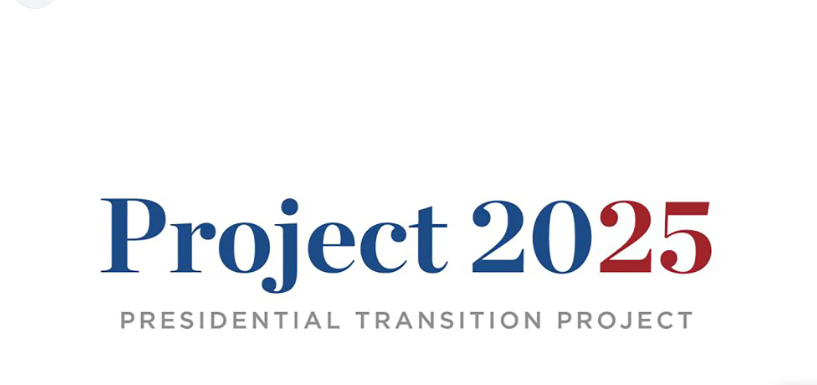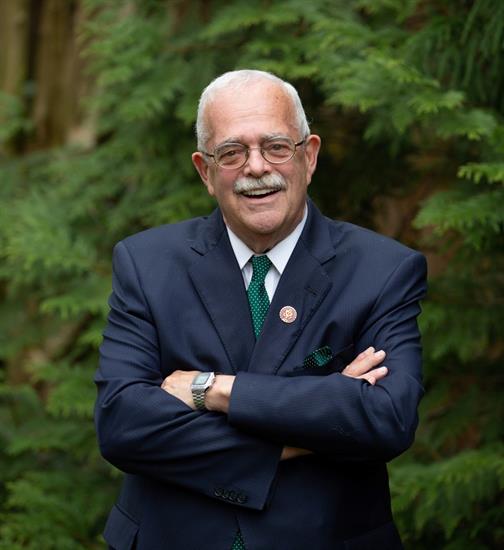How Will Project 2025 Affect Black America?
by Joseph Williams
Project 2025, the far-reaching Republican Party plan to demolish and radically remake the federal government under a Trump presidency, has gotten a lot of attention lately, and not necessarily in a good way.
President Joe Biden warns it’s a threat to democracy. Former President Donald Trump says he had nothing to do with it, even though members of his administration helped write it. Actress Taraji P. Henson sounded the alarm while hosting the BET Awards last month, urging viewers to “look it up! Project 2025 is not a game!”
What’s been missing in the conversation so far about Project 2025 — which calls for eliminating the Department of Education, replacing career civil servants with political appointees, ending affirmative action in government hiring, and virtually eliminating access to abortion, among other sweeping changes — is what it would mean for Black America.
To answer that question, Word In Black took a look at Project 2025’s potential effect on five issues important to Black communities: education, healthcare, the environment, criminal justice and faith.
While some proposals are explicit, others are unclear and likely would face significant, insurmountable barriers. But it’s likely that Trump would use much of it as a roadmap for his second term.
Education
While the document contains dozens of controversial proposals, arguably the biggest one is to shut down the Department of Education, an institution created in 1867, not long after the end of the Civil War. The theory, according to the blueprint, is to eliminate red tape so that families will be “free to choose from a diverse set of school options and learning environments.”
But the plan also would wipe out the Ed Department’s Office of Civil Rights, a sub-agency that enforces civil rights laws and investigates schools accused of engaging in discrimination. Although it’s been 70 years since the Supreme Court outlawed separate-but-equal education in public schools, OCR is not lacking for work: in 2023, it handled more than 19,000 complaints last year, roughly 1,000 more cases than in 2022.
“The total number of complaints has almost tripled since FY 2009, and during this same period OCR’s number of full time equivalent (FTE) staff has decreased from 629 to 556,” according to the Ed Department’s annual report.
Dismantling a cabinet-level agency that’s been around for 157 years and has more than 4,000 employees would probably be a very heavy lift for any administration. But other proposals in Project 2025 would be far easier to initiate: replacing Title I funds to struggling schools with block grants, allowing states to decide how to spend their share of federal tax dollars, expanding school-choice programs, using federal dollars to fund private schools; cutting “wasteful” school meal programs, swapping Pell grants for private loans while eliminating Biden’s student loan forgiveness program; and curbing the teaching of race in schools.
Ultimately, the plan essentially cripples the struggling public education system, which educates the bulk of Black students. It would make it harder to file a discrimination lawsuit. And fewer college-bound Black students — most of whom depend on the federal government to help pay tuition — would be able to pay for higher education.
Health
One of the project’s core objectives is to reduce the federal government’s involvement in healthcare. This means the incoming president could take a battleax to the agencies that run Medicare and Medicaid as well as affiliated offices that research treatments for insidious diseases and approve prescriptions, medical devices, and personal products like cosmetics.
The main goal: fewer Black or low-income people will have healthcare. Black women, especially expectant mothers, will continue having the worst health outcomes, and the practice of medicine will become more politicized than ever.
Although the plan doesn’t explicitly call for a federal ban on abortion, it does list “abortion, reproductive health, reproductive rights” as terms the incoming president must delete from every federal government document to make “institutions of American civil society hard targets for woke culture warriors.” And it removes federal protections for members of the military and their families if they choose to terminate a pregnancy.
The guidebook argues that “HHS also pushes abortion as a form of ‘health care,’…” and that the “FDA should…reverse its approval of chemical abortion drugs because the politicized approval process was illegal from the start.”
The plan also proposes restrictions that effectively criminalize abortion: besides increasing the prospect that abortion providers would face criminal penalties, it calls for the government to track miscarriages, stillbirths, and abortions. It would also restrict access to Plan B contraceptives — even if insurance covers the drugs.
The standard GOP goal of reducing regulations is frequently mentioned and would decrease oversight of healthcare providers and insurers, pharmaceutical companies, and major wrongdoers like the tobacco industry.
Project 2025 also proposes significant changes to Medicaid, including a work requirement, and making Medicare Advantage, currently the paid supplement to Medicare, the default option.
Criminal Justice
Since it began garnering attention, the criminal justice-related headlines from Project 2025 have focused on its proposed politicization of the Justice Department, allowing Trump to salt the department with political appointees and order investigations of his political enemies. But the blueprint also proposes a range of low-key reforms that would have a significant impact on Black communities.
It argues for the undoing of police reforms enacted in the wake of George Floyd’s murder, absolves police departments under federal oversight because of racial discrimination, calls for more draconian sentencing guidelines, and puts federal district court prosecutors on very short leashes.
The justification, according to the report, is a left-wing approach to law enforcement — including progressive prosecutors, lenient judges, and hamstrung police — that has led to a “catastrophic” rise in violent crime.
“In recent years, federal and state officials have succumbed to calls from anti-law enforcement advocates for so-called criminal justice reform,” according to Project 2025. “This campaign is not just ill-advised; it has had real-world consequences.”
In reality, crime has decreased substantially, nationwide, over the last four years. Police departments under federal supervision usually end up that way because an investigation has revealed long-standing patterns of misconduct. Unleashing those departments increases the likelihood that more Black people will end up like Floyd — dead at the hands of aggressive law enforcement with no federal consequences.
And harsher prison sentences for federal offenders are likely to increase the over-incarceration of Black men, a trend that not only harms Black families but also disrupts Black communities.
Faith
Like the priests who blew their horns in the Biblical battle of Jericho, Project 2025 is a clarion call for demolishing the Constitutional wall separating church and state. And it’s not good news for Black Americans.
The plan integrates “Judeo-Christian tradition, stretching back to Genesis,” directly and indirectly, into official government policies, from using taxpayer money to fund parochial schools — which would further undermine public schools — to pushing businesses to close on Sunday, a move experts say would damage the economy.
The project calls for dismantling same-sex marriage, erasing specialized LGBTQ healthcare programs, sharply curbing the sale of abortion pills by mail or in person, and criminalizing pornography. While it doesn’t explicitly ban abortion — the top goal of far-right conservatives — it outlines policies to make the procedure as difficult as possible.
It allows churches to retain tax-exempt status, even if they engage in racial discrimination or partisan political activity. And it reinstates the ban on Muslims immigrating to the U.S.
In short, Project 2025 reads like the fantasy wish list of Christian conservatives while dropping a nuclear bomb in the decades-long, left-vs-right culture wars. Critics say it eliminates individual rights and all but establishes Christianity as a state religion, but supporters say it simply restores traditional values to a nation founded on them.
Leslie Tune-Copeland, senior associate general secretary of the National Council of Churches, says the faith-based portion of Project 2025 does “the absolute opposite” of Christ’s teachings about tolerance and love.
“It’s the absolute opposite in the Bible. Jesus doesn’t force his will on anybody, right?” Tune-Copeland says. “If we’re disciples of Christ, we can encourage people, we can support people, we can minister to people, but we don’t force people to do what we do or to think what we think. But there are people out there who are telling you that that’s exactly what you should be doing.”
Those people, she says, “unfortunately, have manipulated our faith in such a way that people have bought into it. They have bought into some of the lies that white Christian nationalism has told us.”
Climate Justice
When it comes to the American government, there are few things conservatives fantasize about more than cutting programs related to climate change. So, it’s no real surprise that Project 2025 is full of ideas for slashing regulations, weakening government enforcement mechanisms, and cutting federal investment in programs related to the environment.
At this point in history, however, when the window for saving the climate is rapidly closing, those plans would be disastrous — and, like most extreme weather events, the consequences for Black and Brown Americans would surely be even worse.
Project 2025 proposes slicing up the Department of Energy, the Environment Protection Agency, and the National Oceanic and Atmospheric Agency, to name a few. All have a role in either addressing or monitoring climate change. The plan also calls for using the Department of the Interior to expand oil and gas exploration on all public lands. The federal government would eliminate funding and programs for renewable energy, like wind and solar, and would fast-track fossil fuel production.
At the same time, Project 2025 recommends moving climate-related decisions from the hands of actual climate scientists to political officials.
Considering that Paul Dans, the architect of Project 2025, believes the science is still out” on human-caused climate change, you can only guess what kind of political decisions would be made if this plan is put into action.
Heritage’s Paul Dans, director of Project 2025, told The New York Times that one of its aims is to “investigate whether the dimensions of climate change exist.” In terms of the role of fossil fuels in driving climate breakdown, he told the Times: “I think the science is still out on that quite frankly.”
The plan also proposes eliminating multiple clean energy programs and offices within the Department of Energy — such as the Office of Clean Energy Demonstrations, the DOE Loan Program, the Office of Energy Efficiency and Renewable Energy, and DOE’s Clean Energy Corps.
The agenda further says that NOAA should be “broken up and downsized,” claiming it has become “one of the main drivers of the climate change alarm industry.”
A veteran journalist, political analyst, and essayist, Joseph Williams has been published in a wide range of publications, including The New York Times, The Washington Post, Politico, The Boston Globe, The Atlantic, and US News & World Report. A California native, Williams is a graduate of the University Of Richmond and a former Nieman Fellow at Harvard University. He lives and works in metro Washington, D.C.
(Editor’s Note: This article first appeared in Word In Black.)



